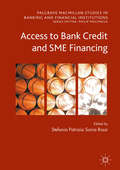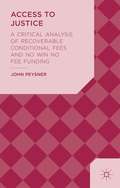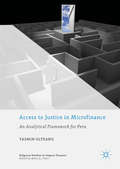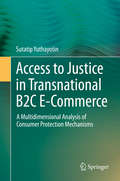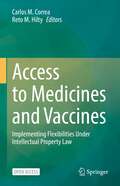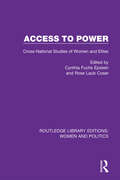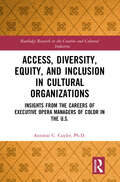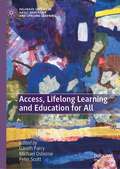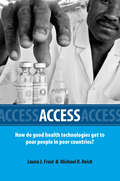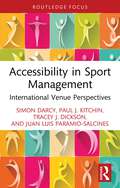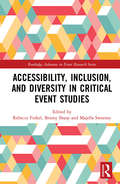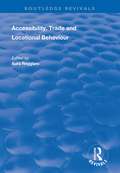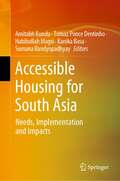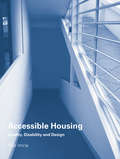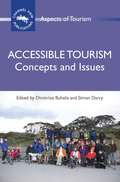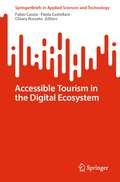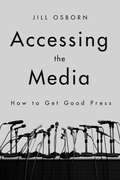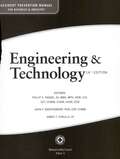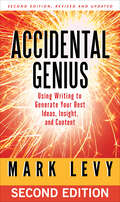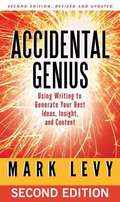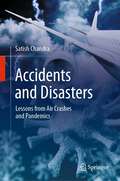- Table View
- List View
Access to Bank Credit and SME Financing (Palgrave Macmillan Studies in Banking and Financial Institutions)
by Stefania RossiThis book explores how the global financial and European sovereign debt crises have forced small-and-medium-sized businesses (SMEs) to reassess and adapt their funding strategies. At the heart of the matter is the worsening access to bank credit for such enterprises. Through this discussion we learn how crucial an understanding of SME-financing is to policy makers, in light of the fact that SMEs dominate the business landscape in Europe and are the main drivers of employment, growth and innovation in the European economy. Contributing chapters present expert analysis and investigate many topics including the problems faced by SMEs in accessing bank credit and the cost of funding and its determinants. Particular attention is also given to how credit-constrained enterprises may reformulate their funding strategies by employing alternative, non-bank, financial resources, and how regulators could support SMEs in broadening and improving their funding opportunities.
Access to Bank Credit in Sub-Saharan Africa: Key Issues and Reform Strategies
by Emilio SacerdotiFinancial report from the IMF
Access to Justice
by John PeysnerAccess to Justice addresses a remarkable experiment in the funding of money damage claims - largely personal injury claims - which began in 2000 and which the Government effectively abolished in 2013. The model - recoverable conditional fees - adopted by the incoming New Labour administration was unique and, for reasons that the book explains, it has remained so. This book is based on a review of published material, the author's own view as a 'participant' in the process and anonymised semi structured interviews with other participants, from Government; claimant and defendant lawyers and litigation insurers. It covers the development, subsequent amendment and effective abolition of the model. It examines the process of policy development, the motivation and objectives of the policy makers and the reactions of the parties attempting to grapple with the new system. It asks whether a development process incorporating a range of models addressing the evidence base might have produced a better result: a workable policy based on the core of Government objectives or, possibly, an entirely different model.
Access to Justice in Microfinance: An Analytical Framework For Peru (Palgrave Studies In Impact Finance Ser.)
by Yasmin OlteanuThis book analyzes the whole path to justice: from the decision to enter the path to justice until justice is achieved and applies a mixed-methods approach using quantitative and qualitative data. It deliberately takes the consumer’s perspective and, beyond the scope of existing studies, does not only take into account the existence of mechanisms and forums to claim justice, but their appropriateness for vulnerable target groups. The book sheds more light on microfinance and other vulnerable clients who, due to existing barriers, cannot access grievance, redress or complaint mechanisms. Eliminating these access barriers would cater to the achievement of the 16th Sustainable Development Goal by increasing vulnerable consumers’ Access to Justice. This book will be of interest to academics researching access to justice, researchers focusing on consumer protection issues in developing countries, and practitioners working in financial inclusion.
Access to Justice in Transnational B2C E-Commerce: A Multidimensional Analysis of Consumer Protection Mechanisms
by Sutatip YuthayotinThis book identifies institutional mechanisms that can be used to promote consumer confidence in direct online sales with businesses (B2C e-commerce). It argues that enhancing the access to justice in a multidimensional sense can potentially offer an effective means of boosting consumer confidence. It introduces a conceptual framework for a multidimensional approach to access to justice in the context of consumer protection, describing the various reasonable criteria needed to satisfy consumer demands in B2C e-commerce. The framework, which reflects all essential aspects of consumers' expectations when they engage in online transactions, provides a benchmark for the evaluation of various consumer protection mechanisms. Based on an analysis of different mechanisms and using the framework's criteria, the practice of private ordering, which does not rely on the creation of rules of law but rather on the use of technology as a solution, appears to offer a meaningful way to enhance access to justice in B2C e-commerce. However, though private ordering holds considerable potential, certain weaknesses still need to be eliminated. This book demonstrates how private ordering can be successfully implemented with the help of an intermediary, a neutral third party that plays an integral part in the collaborative task of facilitating various aspects of private ordering, thus helping to limit the risks of failure and ensuring a fairer market setting. In order to move forward, it argues that the state, with its wealth of material resources and incentive options, is the institution best suited to acting as an intermediary in facilitating private ordering. This promising proposal can improve consumer protection, which will in turn boost consumer confidence.
Access to Market Financing for IDA-eligible Countries--the Role of External Debt and IMF-Supported Programs
by Alun ThomasFinancial report from the IMF
Access to Medicines and Vaccines: Implementing Flexibilities Under Intellectual Property Law
by Reto M. Hilty Carlos M. CorreaThis open access book is the outcome of a Global Forum on Innovation, Intellectual Property and Access to Medicines held in December 2019 at the Max Plank Instititute in Munich, organised by the South Centre and the Max Plank Institute. The academics and experts from international organisations participating have contributed chapters to this book. The book is for policy makers (in Ministries of Health, Ministries of Trade, Ministries of Foreign Affairs, patent offices), but also relevant for academics (law, trade, public health), on the flexibilities available in the Agreement on Trade Related Aspects of Intellectual Property Rights (TRIPS) of the World Trade Organization to promote access to medicines.
Access to Medicines as a Human Right
by Jillian Clare Kohler Lisa FormanAccording to the World Health Organization, one-third of the global population lacks access to essential medicines. Should pharmaceutical companies be ethically or legally responsible for providing affordable medicines for these people, even though they live outside of profitable markets? Can the private sector be held accountable for protecting human beings' right to health?This thought-provoking interdisciplinary collection grapples with corporate responsibility for the provision of medicines in low- and middle-income countries. The book begins with an examination of human rights, norms, and ethics in relation to the private sector, moving to consider the tensions between pharmaceutical companies' social and business duties. Broad examinations of global conditions are complemented by case studies illustrating different approaches for addressing corporate conduct. Access to Medicines as a Human Right identifies innovative solutions applicable in both global and domestic forums, making it a valuable resource for the vast field of scholars, legal practitioners, and policymakers who must confront this challenging issue.
Access to Power: Cross-National Studies of Women and Elites (Routledge Library Editions: Women and Politics)
by Cynthia Fuchs Epstein and Rose Laub CoserOriginally published in 1981, this book is composed of papers that describe and analyse women’s careers in government, business, and the professions. It examines women’s access to and participation in elite careers in the US, and in selected countries of western and eastern Europe – Britain, France, West Germany, Austria, Norway, Finland, Poland, and Yugoslavia – as well as in international organizations. This book was an outgrowth of a conference on ‘Women in decision-making elites in cross-national perspective,’ held at King’s College, Cambridge University, in July 1976. The countries represented were chosen because, although they were at similar stages of economic development, they exhibited differences in political structure, ideology, and tradition.
Access to Trade Finance in Times of Crisis
by Jian-Ye Wang Marcio RonciAccess to Trade Finance in Times of Crisis
Access, Diversity, Equity and Inclusion in Cultural Organizations: Insights from the Careers of Executive Opera Managers of Color in the US (Routledge Research in the Creative and Cultural Industries)
by Antonio C. CuylerAnalyzing the lack of diversity among opera executives, this book examines the careers of executive opera managers of color in the U.S. By interrogating the impact of race on arts managers’ careers, the author contemplates how opera might attract and retain more racially diverse arts managers to ensure its future.With a focus on the U.S., research is contextualized via qualitative data to explore, enhance, and institutionalize access, diversity, equity, and inclusion (ADEI) in the opera industry. In a revealing series of expert-conducted interviews, the author poses illuminating questions, such as: what if an inability to recruit and retain diverse executives is the primary source of opera’s challenges? if more racially diverse opera executives existed, would the art form persist in struggling to find its place in contemporary society? from where will the next generation of diverse opera managers emerge? As the magnitude of the global diversity problem grows within the creative and cultural industries, this book serves as a guide for Arts Management practitioners and students who may view their class, different ability, ethnicity, gender, race, or sexual orientation as a liability in their pursuit of executive careers.
Access, Lifelong Learning and Education for All (Palgrave Studies in Adult Education and Lifelong Learning)
by Peter Scott Michael Osborne Gareth ParryThis book examines access, lifelong learning and education for all, which have been policy preoccupations in all countries for more than half a century, but have been overlaid and pushed aside by the development of mass higher education. The authors examine what has been achieved, what lessons have been learnt and what still remains to be done, addressing matters of equity, agency, community, mobility and hierarchy.
Access: How Do Good Health Technologies Get to Poor People in Poor Countries?
by Michael Reich Laura J. FrostMany people in developing countries lack access to health technologies, even basic ones. Why do these problems in access persist? What can be done to improve access to good health technologies, especially for poor people in poor countries?This book answers those questions by developing a comprehensive analytical framework for access and examining six case studies to explain why some health technologies achieved more access than others. The technologies include praziquantel (for the treatment of schistosomiasis), hepatitis B vaccine, malaria rapid diagnostic tests, vaccine vial monitors for temperature exposure, the Norplant implant contraceptive, and female condoms. Based on research studies commissioned by the Bill & Melinda Gates Foundation to better understand the development, adoption, and uptake of health technologies in poor countries, the book concludes with specific lessons on strategies to improve access. These lessons will be of keen interest to students of health and development, public health professionals, and health technology developers--all who seek to improve access to health technologies in poor countries. This edition now includes a new preface by the authors.
Accessibility in Sport Management: International Venue Perspectives (European Association for Sport Management Series)
by Tracey J. Dickson Simon Darcy Paul J. Kitchin Juan Luis Paramio-SalcinesThis book introduces the fundamental principles of accessible and inclusive sport venue management, with a focus on people with disability. It offers a social‑ecological analysis of how governments, businesses, the disability social movement, sports organisations, and their stakeholders can, and should, make sport more accessible and inclusive.Using a critical disability studies perspective, this book highlights recent global human rights initiatives, challenges, and ongoing resistance to the drive for accessibility in sport venue management. Drawing on the latest research, it takes a step‑by‑step look at the sporting experience – including pre‑experience planning, travel to and from an event, the built environment, the experience itself, and online participation – and considers how each phase might be made more accessible and inclusive, and how commercial and social justice considerations intersect.Addressing the needs of participants, consumers, employees, volunteers, and organisations, this book is essential reading for any student, researcher, practitioner, or policymaker with an interest in sport management, disability sport, event management, corporate social responsibility, disability studies, or human rights.
Accessibility, Inclusion, and Diversity in Critical Event Studies (Routledge Advances in Event Research Series)
by Rebecca Finkel Briony Sharp Majella SweeneyMost early social research into planned events had the effect of broadcasting narratives of dominant cultures and privileged groups. More recently, however, convergences of gender, sexualities, ethnicities, age, class, religion, and intersectional analyses and events studies have started to drive new critical understanding of the impacts of events on non-mainstream, non-majority communities around the globe. This timely book addresses current gaps in the literature surrounding issues of accessibility, inclusion, and diversity in various event landscapes. Structured into four parts covering the main types of events, the chapters present original topics using innovative methodological approaches. Each chapter employs a case study to illustrate the key intertwining issues in these various experiential realms. Further, the chapters are all cross- or interdisciplinary, drawing on gender, sexualities, cultural, race/ethnicity studies as well as multiple literatures that feed into critical events studies and exploring a variety of global examples. This significant book opens the path to further research on the role and importance of accessibility, inclusion, and diversity in events environments worldwide. It will be of interest to academics and researchers of critical event studies as well as a number of related social science disciplines.
Accessibility, Trade and Locational Behaviour (Routledge Revivals)
by Aura ReggianiFirst published in 1998, this timely volume features 30 specialists in civil engineering, economics, computer science, architecture, technology and infrastructure and revisits – theoretically, methodologically and empirically – the conventional concepts and measures of accessibility, and connectivity / functioning of the networks, accessibility and dynamic location effects.
Accessible Housing for South Asia: Needs, Implementation and Impacts
by Amitabh Kundu Sumana Bandyopadhyay Tomaz Ponce Dentinho Habibullah Magsi Kanika BasuThis book deals with important issues related to urban housing in South Asia. It analyses various aspects of housing, including spatial and temporal requirements and needs, as well as the challenges of implementing housing projects, such as financial feasibility of estate development projects and housing design. Finally, it discusses the socio-economic and environmental impacts of the rapid urban housing development in South Asia. Written by experts from various disciplines, the book presents several case studies that address issues such as housing provision; legislative, financial and technical support; access to employment opportunities and markets; the cumulative impact on gentrification; exclusion and spatial equity; and the economic, social and environmental sustainability of urban tissue. Researchers, housing planners, and policy makers will find this book a valuable resource in meeting the demand for affordable and sustainable housing and overcoming housing shortages in developing countries
Accessible Housing: Quality, Disability and Design
by Rob ImrieConsidering the interrelationships between disability and housing design with a focus on the role of policy in addressing the housing needs of disabled people, this book sets out some of the broader debates about the nature of housing, quality and design. In what ways are domestic design and architecture implicated in inhibiting or facilitating mobility and movement of people? What is the nature of government regulation and policy in relation to the design of home environments? The author addresses these questions, and brings a range of approaches to accessible design in housing to the forefront of debate, assessing how far policies and practices are equal to the challenge of creating accessible and desirable home environments.
Accessible Tourism
by Dimitrios Buhalis Simon DarcyInclusion, disability, an ageing population and tourism are increasingly important areas of study due to their implications for both tourism demand and supply. This book therefore sets out to explore and document the current theoretical approaches, foundations and issues in the study of accessible tourism. In drawing together the contributions to this volume the editors have applied broader social constructionist approaches to understanding the accessible tourism phenomena. Accessible tourism, as with any area of academic study is an evolving field of academic research and industry practice. As with other areas of tourism, the field is multidisciplinary, and is influenced by various disciplines including geography, disability studies, economics, public policy, psychology and marketing.
Accessible Tourism in the Digital Ecosystem (SpringerBriefs in Applied Sciences and Technology)
by Fabio Cassia Paola Castellani Chiara RossatoThis book explores the growing demand for accessible tourism experiences and demonstrates how the perspective of digital ecosystems can play a vital role in creating more inclusive destinations. Through a combination of conceptual arguments and real-world case studies, the book sheds light on the practical aspects of accessible tourism. Statistics reveal that over one billion people have severe or moderate disabilities, emphasizing the urgent need for enhanced accessibility in tourism. However, both industry practices and academic research in this field are still lagging behind. The book highlights the challenge of establishing coordination among various stakeholders, including transport operators, hospitality firms, and public authorities, which has hindered the design and implementation of inclusive tourism experiences. By harnessing the power of new technologies, the book illustrates how digital ecosystems can effectively facilitate accessible tourism. It examines the demand for such experiences and demonstrates how embracing a digital ecosystem perspective can contribute to the development of more accessible tourism destinations. In addition to its theoretical insights, the book delves into several practical case studies that showcase successful examples of accessible tourism.
Accessing the Media: How to Get Good Press
by Jill OsbornAccessing the Media takes the reader behind the scenes to understand how best to work with press to get publicity. Perfect for politicians, business leaders, lobbyists, and media junkies, this reference provides an insider's look at how the modern newsroom works, detailing the different roles of reporters, editors, and producers. Readers will learn how to forge relationships with media personnel in television, radio, print, and the web to craft the press coverage they want.Award-winning journalist Jill Osborn exposes the three strategic steps that must be used to gain favorable coverage with the media at just the right time. She gives you the inside scoop on how to think like a national or local journalist so you can control the headlines. And she even provides sample press releases to help shape your message. When reading Accessing the Media, you will have a personal media consultant without the cost of hiring one.Whether you are running for office, looking to improve visibility for your business, or simply want a deeper understanding of what you see and read in the news, Accessing the Media is the perfect guide to getting your story out to the world.
Accident Prevention Manual for Business & Industry: Engineering & Technology
by National Safety CouncilFor more than 50 years, professionals have relied on the Accident Prevention Manuals for unbiased, well-researched information on best practices in safety and health. The textbooks outline industry standards for progressive safety programs and administrative practices reflecting current industry trends and regulations. This comprehensive manual focuses on facilities, workplace exposure and protections, materials handling, production operation, and industry-specific safety issues. The latest edition of the Engineering & Technology volume features brand new chapters detailing safety requirements for the aviation, oil and gas, and waste and recycling industries, and includes updated and expanded chapters on safeguarding, electrical safety, nanomaterials in the workplace, welding and cutting, and working with hot and cold metals. It also contains an updated chapter on process safety management that was previously published in the Administration & Programs volume. This newest edition keeps you on the cutting edge of safety engineering and technological design for industrial facilities.
Accidental Genius: Using Writing to Generate Your Best Ideas, Insight, and Content
by Mark Levy&“Mark Levy teaches readers a wonderful mental technology, freewriting, that helps you dive deep into your unconscious to discover treasures.&”—B. J. Bueno, coauthor of The Power of Cult Branding When it comes to creating ideas, we hold ourselves back. That&’s because inside each of us is an internal editor whose job is to forever polish our thoughts so we sound smart and in control and so we fit into society. But what happens when we encounter problems where such conventional thinking fails us? How do we get unstuck? For Mark Levy, the answer is freewriting, a technique he&’s used for years to solve all types of business problems and generate ideas for books, articles, and blog posts. Freewriting is deceptively simple: start writing as fast as you can, for as long as you can, about a subject you care deeply about, while ignoring the standard rules of grammar and spelling. Your internal editor won&’t be able to keep up with your output—you&’ll generate breakthrough ideas and solutions that you couldn&’t have created any other way. Levy shares his six secrets to freewriting as well as fifteen problem-solving and creativity-stimulating principles you can use if you need more firepower—seven of which are new to this edition. Also new to this edition: an extensive section on how to refine your raw freewriting into something you can share with the world. &“Whether you have writer&’s block, face a tight deadline, or just don&’t know how to get across all those wonderful ideas rambling around in the back of your head, Mark Levy has the solution for you.&” —B. Joseph Pine II, coauthor of The Experience Economy
Accidental Genius: Using Writing to Generate Your Best Ideas, Insights, and Content
by Mark LevyLevy shows readers how to tap into their most powerful creative thinking by using a variety of writing exercises. This second edition includes updates on how to use these exercises to generate raw material for books, articles, presentations, blog posts, and tweets.
Accidents and Disasters: Lessons from Air Crashes and Pandemics
by Satish ChandraThis book deals with the contemporary subject of perception of risk and its influence on accidents and disasters. The contents examine the conventional viewpoints on human errors, incubation of errors, complexity and organisational deviance as a cause for accidents. Work of Mary Douglas with regard to risk, Charles Perrow's work on the normal accident theory and Diane Vaughn's theory on normalisation of deviance are examined from a fresh perspective in this book. It also discusses prominent accidents in aviation, space, nuclear energy, automotive and healthcare, using the pandemic and Boeing 737 Max as a backdrop to study accidents and disasters. It further explores the background and similarities to these events and addresses the core issues such as the state of regulation, the worldview of the sociologists, and proposes that mental models of complex systems, avarice and risk for gain as other possibilities for accidents. Using the concept of nudge in behavioural economics and the Elinor Ostrom’s viewpoint on regulating for common good, it suggests a way forward through the High Reliability Organisation Theory (HRO) leading to enhanced risk perception. The book will be of interest to those who would like to understand the need to incorporate risk perception into regulation, engineers and scientists, professionals and policy makers working in the areas of disaster and risk management, technology areas like aviation, nuclear plants, space and healthcare, students of the sociology of risk and of course the general reader.
